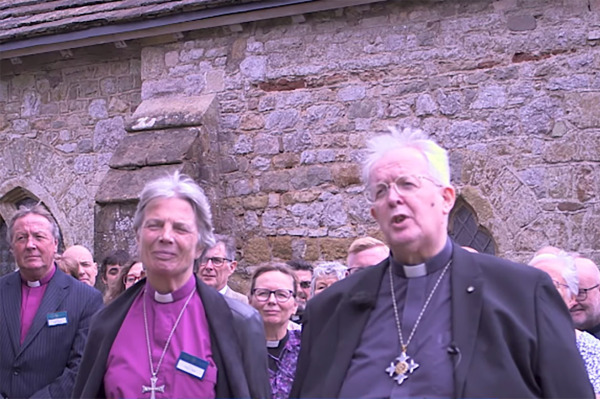Frank Turek says concept of 'relative truth' is a false idea that contradicts itself

Apologist Frank Turek recently shot down the idea of truth being relative, countering that such an idea is inherently at odds with itself, logically speaking.
The 60-year-old author, public speaker, radio host and founder of the Christian apologetics ministry CrossExamined.org told an audience of predominantly young adults at Cornerstone Chapel in Leesburg, Virginia, on Monday that any statement claiming that "there is no truth" is a "self-defeating" statement because it contradicts itself.
"You hear people saying: 'there's no truth. You got your truth. I got my truth. All truth is relative.'… Well, if there's no truth, Christianity can't be true. … If there's no truth, atheism can't be true either. In fact, if there was no truth, would you ever go to school? Would you ever go to church? Would you ever call somebody out on a lie if there was no truth? No. Lies presuppose there's truth. Right? Of course, there's truth," Turek said.
"If someone were to say to you: 'there is no truth,' you should ask that person a question. … You ought to say: 'Hey, is that true? Is it true that there's no truth? Because if it's true that there's no truth, the claim there is no truth can't be true, but it claims to be true.'"
Turek defined a "self-defeating statement" as one that "doesn't meet its own standard" because it "violates the law of non-contradiction," which is "one of the fundamental laws of all thought. That says that opposite ideas cannot both be true at the same time and in the same sense."
"For example, if I were to say: 'I can't speak a word in English.' What would you say? 'You just used English to say it.' Right? This is a self-defeating statement. And the easiest way to identify self-defeating statements is to turn the claim on itself. That's the thinking skill. You've got to get good at turning the claim on itself," Turek noted.
When Christians are faced with people who question Christianity, Turek said, they should "call a timeout briefly and apply the claim to itself [by turning] the claim on itself."
Turek said if someone were to say to a Christian "all truth is relative," the Christian can turn the claim around by replying, "Is that a relative truth?"
"It's an absolute truth, while claiming 'all truth is relative.' It's like when people say: 'there are no absolutes.' What are you going to say to him? 'Is that an absolute?'" he explained.
In our culture today, Turek said people will often say: "there isn't the truth, only my truth," noting further examples like "you've got your truth, I've got my truth" and "you live your truth, I live my truth."
"Sounds like everybody ought to agree with this, right? There's just a problem. When somebody says: 'there isn't the truth, only my truth,' if you turn the claim on itself, what question are you going to ask back?" Turek asked the audience.
"You can say this: 'is that just your truth or the truth?' Right? If this statement up here is just 'your truth,' in other words, just your opinion, then why should I believe it? Right? But, if you're saying that this statement up here is 'the truth,' you just got done telling me there aren't any 'the truths.' You see the problem here? This is a 'the truth' statement claiming there are no 'the truths.'"
When people say "there's no truth in anything but science," Turek said the statement can be turned on itself by responding, "Is that statement science? Is that a scientific truth?"
"Can you go into the laboratory and prove this claim? No, that's a philosophical claim. You can't prove that in the laboratory. In fact, you can't do science without philosophy," Turek rationalized.
"Science doesn't say anything. Scientists do. And why am I saying that? Because all data needs to be gathered, and then all data needs to be interpreted. And who does that? Scientists do that. Science doesn't say anything."
Turek said it's important for Christians to understand that virtually every doubting question a non-Christian asks them about the topic of truth can be revealed as contradictory.
The apologist also said it is important for Christians to understand that sharing the truth is about more than just humbly contradicting those who question the faith. He said there are two kinds of faith, "belief that" and "belief in."
"'Belief that' is getting evidence that God exists, that Jesus rose from the dead,that the documents are telling us the truth. All that is apologetics; getting evidence for what you believe. But all the 'belief that' in the world won't get your moral transgressions forgiven. For that, you got to go from 'belief that' to 'belief in,'" Turek stated.
He noted that James, the half-brother of Jesus, wrote in James 2:19 that "even the demons believe that God exists, but they tremble."
Turek said the demons referenced didn't want to trust in Jesus. Even though the demons know He is God, "they don't trust in Him."
"There's a difference between 'belief that' and 'belief in.' 'Belief that' is just of the head. 'Belief in' is not only of the head, but it's of the heart. You can know something's true and still not trust in it," Turek elaborated.
"In fact, we know this in relationships. Don't we? In fact, when I first met my wife 37 years ago, I got evidence that she would be a good wife. But all the evidence in the world didn't make her my wife. I had to take a step of trust in her to ask her to be my wife. … That's the difference between 'belief that' and 'belief in.'"
Turek claimed that he has often heard people who reject Christianity because they are facing a "heart-issue" rather than because of factual evidence.
"The problem isn't in the head. The problem is in the heart," Turek added. "They don't want it to be true."





















